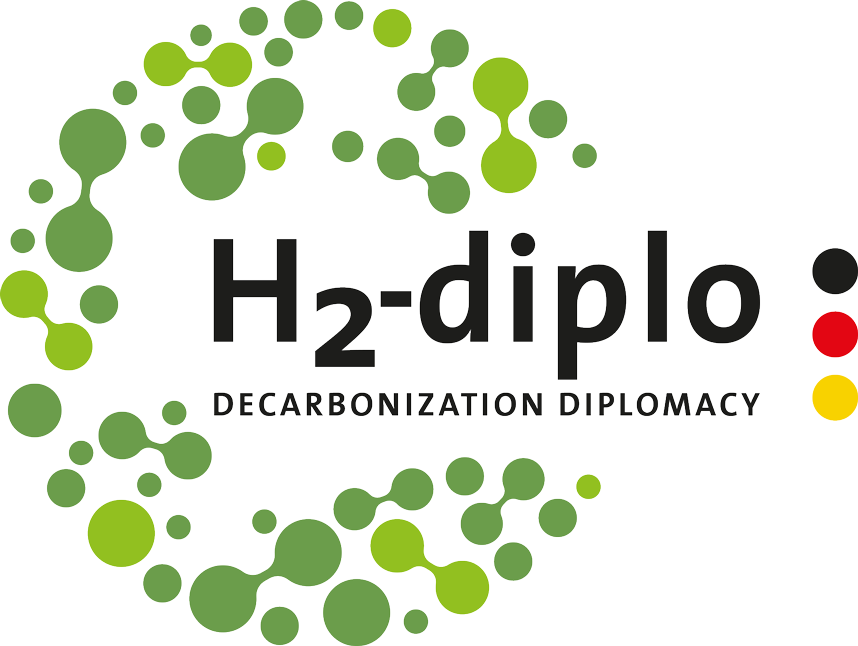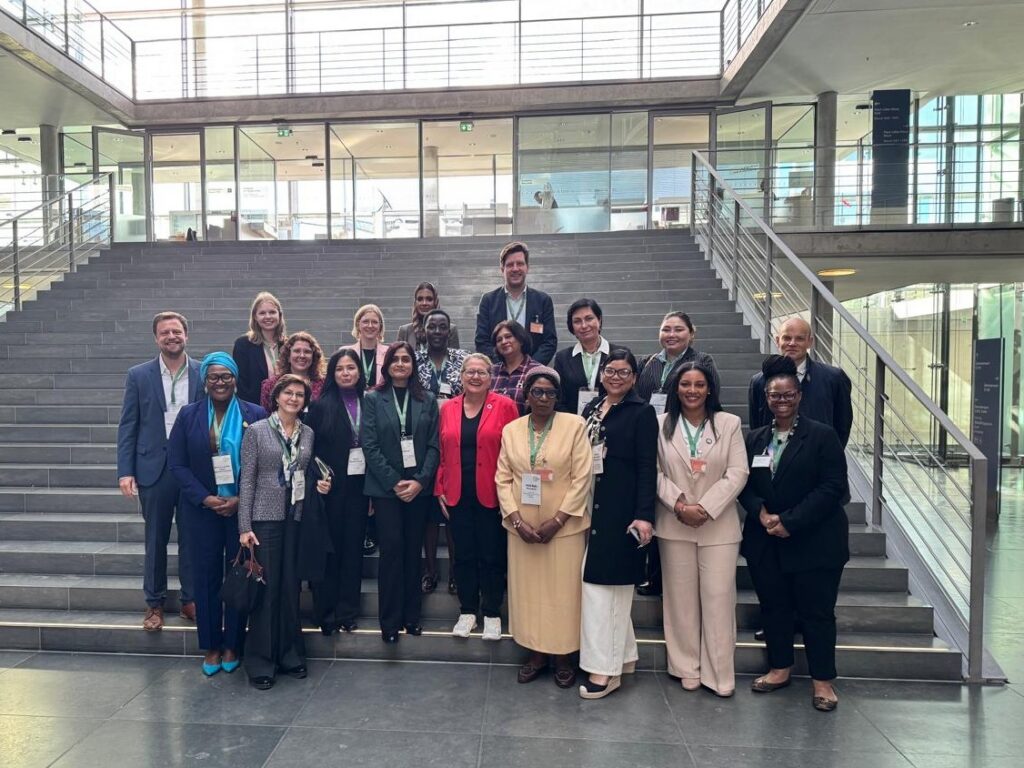This September, H2-diplo had the privilege of hosting a delegation of female leaders from ten countries across Africa, Latin America, Asia, and Europe for a week-long study trip through Berlin and Bonn. The programme explored the global green energy transition, its geopolitics, and the critical role of female leadership in shaping a just and sustainable future. From high-level policy discussions to practical industry insights, and from network-building to conversations on best practices on gender and inclusivity, the trip created a space to exchange experiences, strengthen international cooperation, and develop shared visions for the road ahead.
Setting the Stage in Berlin: Policy, Geopolitics, and Gender Justice
The week began in Berlin, where participants were welcomed at the Federal Foreign Office for an exchange with Meik Laufer (Head of Unit for Hydrogen Diplomacy and the Geopolitics of the Energy Transition), Jennifer Tollmann (Senior Advisor), and Nora Löhle (Senior Advisor on Climate Foreign Policy) on Germany’s energy transition and global climate diplomacy. The delegates effectively used this opportunity to share the very different contexts of their respective countries and how this shapes their energy transition pathways and asks from Germany as a leader in climate cooperation.
At the Bundestag, they met with the female members of parliament Svenja Schulze (SPD), Elisabeth Winkelmeier-Becker (CDU) and Violetta Bock (Die Linke) to discuss shared challenges and opportunities in legislating and implementing a just energy transition, as well as the importance of cross-border networks of women leaders in advancing this goal. The fruitful discussions included ideas of expanding their cross-country networks of parliamentarians as part of the COP preparations in Brazil this year.
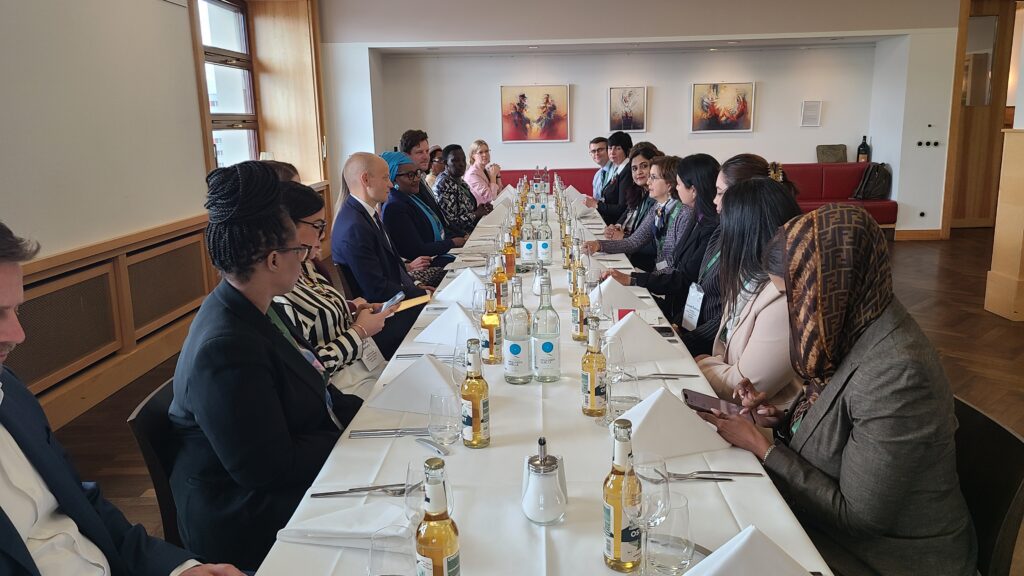
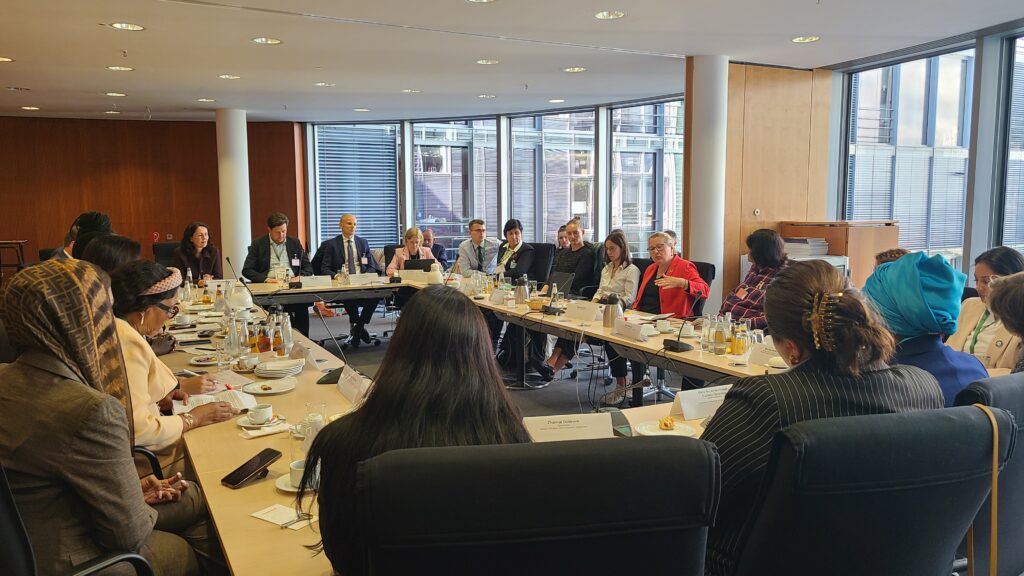
The following day turned to geopolitics and female leadership. Expert panels with researchers and practitioners, together with powerful contributions from our delegates, underlined that while contexts differ across regions, challenges such as structural barriers for women and the unequal burden of energy poverty are strikingly similar.
Marcus Hicken (AA) stressed Germany’s continued commitment to the energy transition and how it has become part of the German security agenda, given the increasing rivalries with China over green technologies and the European dependence on Russian gas. Dr. Kira Vinke (DGAP) in her opening remarks presented key geopolitical issues in the global energy transition, focusing on the insecurity that can arise from the dependencies on critical minerals across the world. Parul Kumar (EPICO) and Sonja Thielges (SWP) added critical reflections on geopolitical challenges and opportunities in the energy transition, drawing connections to parallel developments in the US administration.
The second panel on female leadership elaborated how a feminist lens in the energy transition is not optional, but a prerequisite for a just, resilient, and acceptable transformation.
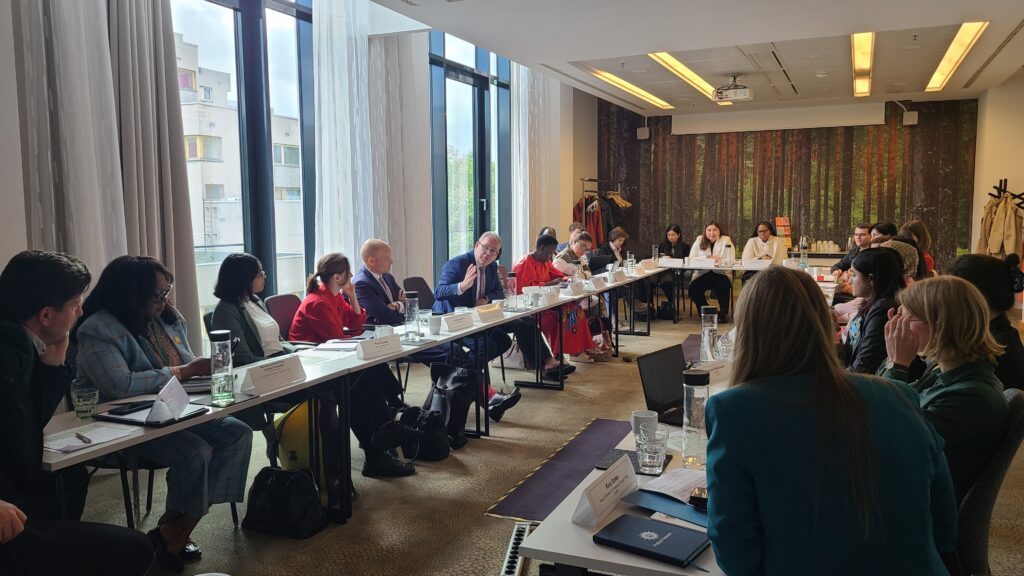
Norovsuren Enkhbaatar presented the key take-aways from the previously issued H2-diplo study, setting the scene for fruitful discussions amongst the panellists. Prof. Dr. Kathrin Goldammer (CEO of Reiner Lemoine Institute) shared her practices in her company to break down workplace sexism which met admiration amongst the participants. Lucy Ombaka (Professor at RheinMain University of Applied Sciences) and Korinna Jörling (NOW) further explored structural barriers for women in the African and European energy transitions and in different workplace settings. Contributions from our delegates concluded why “the face of energy poverty is a woman”, reinforcing the need for a feminist lens in the energy transition to ensure justice and trust.
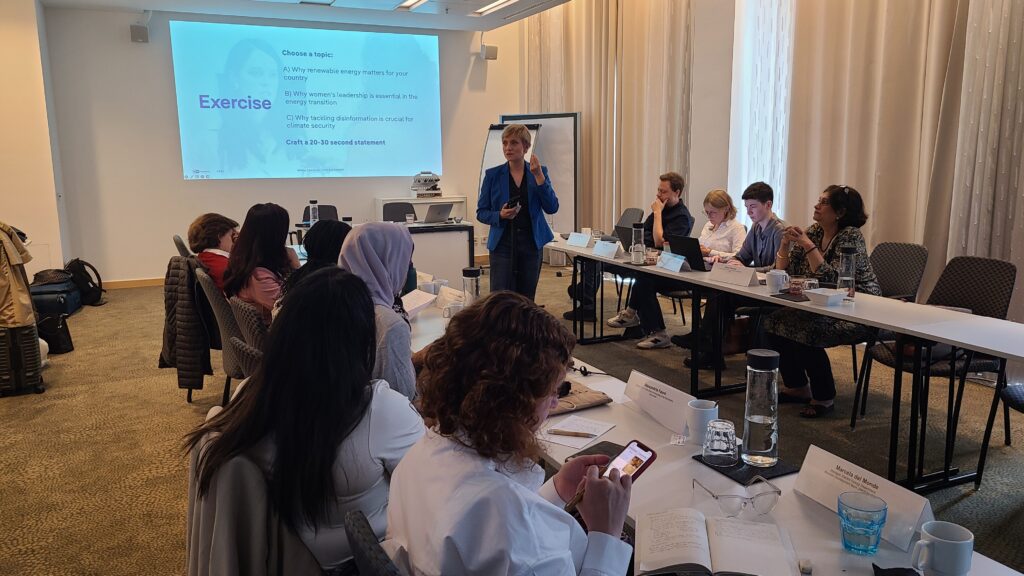
This part of the study trip concluded with a workshop in collaboration with DW Akademie on countering climate disinformation. Joanna Hammer (AA) kicked off the meeting my presenting her units work on strategic communication and how the Federal Foreign Office tracks and addresses disinformation and FIMI which women tend to be victimized off much more often than their male counterparts. Marianna Evenstein led the workshop which equipped participants with tools to strengthen communication and resilience in the face of misinformation, a growing threat to global cooperation on climate.
In Bonn: From Industrial Decarbonization to International Cooperation
In the second half of the week, the delegation travelled to Bonn and Duisburg, where theory met practice. At Thyssenkrupp in Duisburg’s industrial park, participants saw how large-scale industrial actors are driving innovation with projects like Carbon2Chem and alkaline water electrolysis. These site visits sparked rich exchanges with Dr. Monika Bosilj (Uhde) and Corinna Hader (Nucera) on technology co-development, research partnerships, and the challenges of scaling up solutions in diverse national contexts.
In Bonn, discussions moved to the global stage. At the UN Climate Change Secretariat (UNFCCC) in Bonn, our participants were welcomed by the UNFCCC Deputy Executive Secretary Noura Hamladji who stressed the need to use all available international platforms to expand coalitions to together drive forward the just energy transition globally. Leaders engaged with the UNFCCC experts Perumal Arumugam, Nicolas Müller, Kusum Lata Jain, Gabriela Balvedi Pimentel, and Vintura Silva on the gender-climate-security nexus, reflecting on how gender-inclusive strategies can amplify the success of climate responses and projects. Discussions also centered on implementation issues of global decarbonization, where the UN lately engages on supporting project pipelines and investments taking off. It was stressed that the focus shift from announcements to actual implementation in COPs going forward. NDCs represent national measures to strategise economic, security, and climate transformations, but also international cooperation and coalitions.
The trip concluded at GIZ in Bonn during a lunch hosted by Dr. Claudia Mayer (Head of Section, Environment, Biodiversity, Forestry, GIZ), where participants shared personal takeaways, identified concrete follow-up opportunities, and agreed to continue as a growing international network of female leaders in the energy transition.
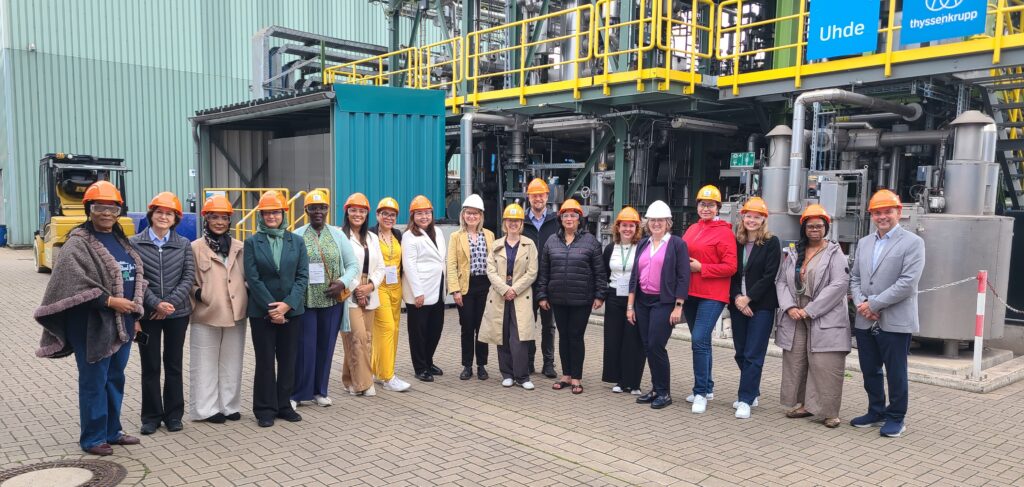
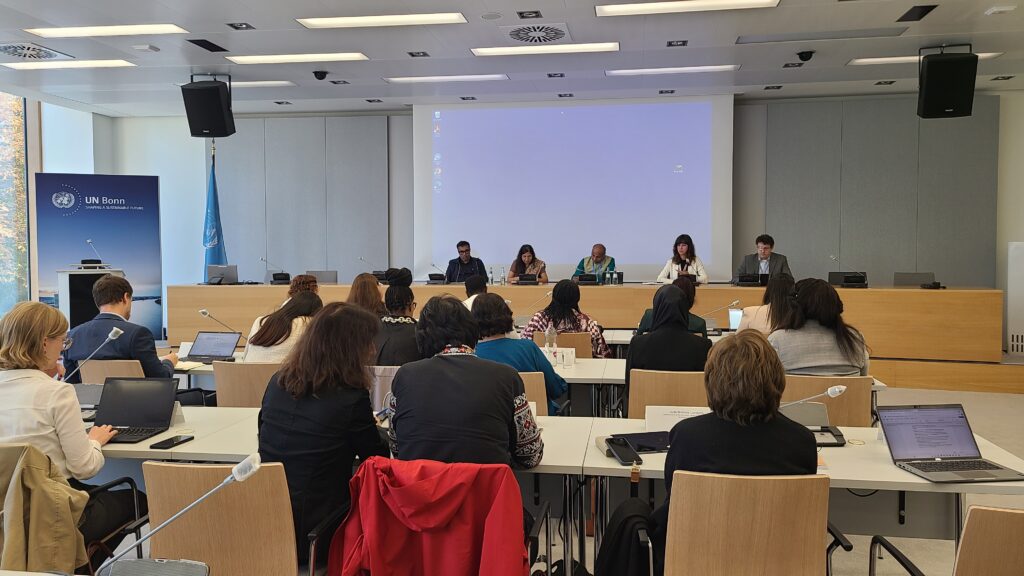
A Lasting Takeaway
This study trip confirmed what our delegates demonstrate daily in their work: the global energy transition is not only a technological and political challenge, but also a question of leadership, justice and societal change. Female leaders bring perspectives that are essential to ensuring inclusivity, tackling inequalities, and strengthening trust across borders. For H2-diplo, this was not the end, but a beginning. We are proud to have facilitated this exchange and look forward to accompanying these inspiring leaders as they shape the energy transition in their countries, communities, and on the global stage.
For more news about the H2-diplo activities, follow us on LinkedIn: H2-diplo – Decarbonization Diplomacy | LinkedIn.
